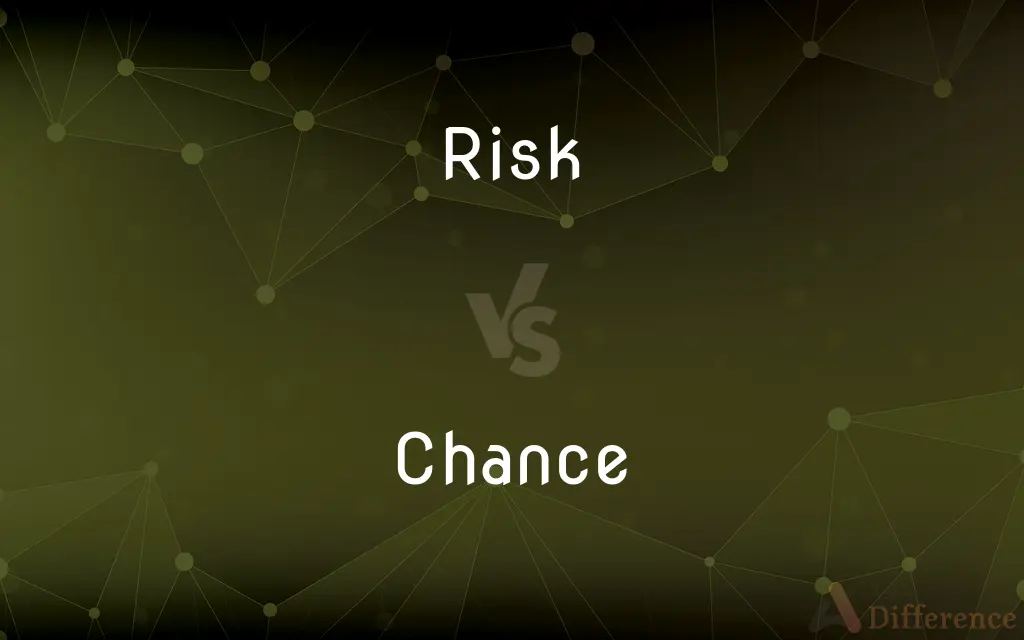Risk vs. Chance — What's the Difference?
By Tayyaba Rehman & Fiza Rafique — Updated on March 10, 2024
Risk involves exposure to danger or loss, focusing on negative outcomes; chance emphasizes unpredictability and can denote opportunity or hazard.

Difference Between Risk and Chance
Table of Contents
ADVERTISEMENT
Key Differences
Risk is inherently linked to the possibility of experiencing harm or loss, highlighting a potential negative impact on objectives. On the other hand, chance is a neutral term that describes the likelihood of any event happening, which can be either beneficial or detrimental.
When considering risk, there's often an assessment of probability and impact, aimed at mitigating negative outcomes. Whereas chance does not inherently involve such assessments, focusing instead on the randomness of outcomes.
Risk management involves strategies to minimize potential losses or threats, indicating a proactive approach to dealing with potential negatives. Conversely, chance is typically approached with a more passive attitude, relying on luck or randomness rather than deliberate intervention.
In financial contexts, risk is quantified to manage investments and predict potential losses. Chance, however, is often invoked to describe the unpredictability of returns without a direct emphasis on loss.
Risk is seen as something to be managed or avoided to protect assets and well-being. Meanwhile, chance is often celebrated or feared, depending on its association with luck or fortune.
ADVERTISEMENT
Comparison Chart
Definition
The possibility of suffering harm or loss.
The occurrence and development of events in the absence of any obvious design.
Focus
Primarily on negative outcomes.
Neutral, encompassing both positive and negative outcomes.
Management
Involves strategies to minimize or mitigate.
Often left to randomness or luck.
Quantification
Assessed in terms of probability and impact.
Described in terms of likelihood without emphasis on specific outcomes.
Cultural Perception
Often viewed negatively, something to be managed.
Can be seen as an opportunity or a risk, depending on context.
Compare with Definitions
Risk
Calculated decision to achieve gain.
She took a risk by starting her own business.
Chance
Outcome of randomness.
Winning the lottery is all about chance.
Risk
Possibility of loss or injury.
Skiing carries a risk of injury.
Chance
Fortuitous event.
By chance, I found a $20 bill on the street.
Risk
Insurance industry term.
Fire is considered a high risk in forested areas.
Chance
Risk without negative connotation.
Let's take a chance on the new restaurant.
Risk
Someone or something that creates hazards.
A wet floor is a risk for slips.
Chance
Opportunity for advancement.
He took a chance on a new job in a different city.
Risk
Exposure to danger.
Investing in stocks involves the risk of losing money.
Chance
Probability of an occurrence.
There's a good chance of rain tomorrow.
Risk
In simple terms, risk is the possibility of something bad happening. Risk involves uncertainty about the effects/implications of an activity with respect to something that humans value (such as health, well-being, wealth, property or the environment), often focusing on negative, undesirable consequences.
Chance
The unknown and unpredictable element in happenings that seems to have no assignable cause.
Risk
The possibility of suffering harm or loss; danger.
Chance
A force assumed to cause events that cannot be foreseen or controlled; luck
Chance will determine the outcome.
Risk
A factor, thing, element, or course involving uncertain danger; a hazard
"the usual risks of the desert.
Chance
Often chances The likelihood of something happening; possibility or probability
Chances are good that you will win. Is there any chance of rain?.
Risk
The danger or probability of loss to an insurer.
Chance
An accidental or unpredictable event
"He sprang to his feet and turned to run. At the same moment by a lucky chance the moon broke through the clouds" (Arthur Conan Doyle).
Risk
The amount that an insurance company stands to lose.
Chance
A favorable set of circumstances; an opportunity
A chance to escape.
Risk
The variability of returns from an investment.
Chance
A risk or hazard; a gamble
Took a chance that the ice would hold me.
Risk
The chance of nonpayment of a debt.
Chance
(Games) A raffle or lottery ticket.
Risk
One considered with respect to the possibility of loss
A poor risk.
Chance
(Baseball) An opportunity to make a putout or an assist that counts as an error if unsuccessful.
Risk
To expose to a chance of loss or damage; hazard.
Chance
Caused by or ascribable to chance; unexpected, random, or casual
A chance encounter.
A chance result.
Risk
To incur the risk of
His action risked a sharp reprisal.
Chance
To take the risk or hazard of
We thought we could jump over the puddle, but we were not willing to chance it.
Risk
(uncountable) The probability of a negative outcome to a decision or event.
There is risk of being brutalized, arrested, imprisoned and tortured, all because I want you to know the truth about this matter.
Chance
To have the fortune (to be or do something); happen
"My eye chanced to fall on the wizened houseplant on the windowsill" (Elisabeth Brink).
Risk
(uncountable) The magnitude of possible loss consequent to a decision or event.
Chance
Used with the impersonal subject it and a following clause or infinitive to indicate the occurrence of a usually unexpected or chance event
"Now it chanced that this car-line was owned by gentlemen who were trying to make money" (Upton Sinclair).
Risk
The potential negative effect of an event, determined by multiplying the likelihood of the event occurring with its magnitude should it occur.
Chance
(countable) An opportunity or possibility.
We had the chance to meet the president last week.
Risk
(countable) A possible adverse event or outcome.
Chance
(uncountable) Random occurrence; luck.
Why leave it to chance when a few simple steps will secure the desired outcome?
Risk
(insurance) A type of adverse event covered under an insurance policy.
Chance
(countable) The probability of something happening.
There is a 30 percent chance of rain tomorrow.
Risk
(countable) A thing (from the perspective of how likely or unlikely it is to cause an adverse effect).
That man is going to be a big risk once he's out of prison.
Those stairs are a major risk.
Chance
(in plural as chances) probability; possibility.
Risk
A borrower (such as a mortgage-holder or person with a credit card).
A good credit rating indicates the customer is a desirable risk.
Chance
What befalls or happens to a person; their lot or fate.
Risk
(finance) A financial product (typically an investment).
Subprime mortgages are poor risks; especially for a pension scheme.
Chance
Happening by chance, casual.
Risk
(insurance) An entity insured by an insurer.
Chance
(obsolete) Perchance; perhaps.
Risk
(transitive) To incur risk of (something).
Chance
To happen by chance, to occur.
It chanced that I found a solution the very next day.
Risk
(transitive) To incur risk of harming or jeopardizing.
Chance
To befall; to happen to.
Risk
(transitive) To incur risk as a result of (doing something).
Chance
To try or risk.
Shall we carry the umbrella, or chance a rainstorm?
Risk
Hazard; danger; peril; exposure to loss, injury, or destruction.
The imminent and constant risk of assassination, a risk which has shaken very strong nerves.
Chance
To discover something by chance.
He chanced upon a kindly stranger who showed him the way.
Risk
Hazard of loss; liabillity to loss in property.
Chance
(Belize) To rob, cheat or swindle someone.
The car broke down a week after I bought it. I was chanced by that fast-talking salesman.
Risk
To expose to risk, hazard, or peril; to venture; as, to risk goods on board of a ship; to risk one's person in battle; to risk one's fame by a publication.
Chance
A supposed material or psychical agent or mode of activity other than a force, law, or purpose; fortune; fate; - in this sense often personified.
It is strictly and philosophically true in nature and reason that there is no such thing as chance or accident; it being evident that these words do not signify anything really existing, anything that is truly an agent or the cause of any event; but they signify merely men's ignorance of the real and immediate cause.
Any society into which chance might throw him.
That powerWhich erring men call Chance.
Risk
To incur the risk or danger of; as, to risk a battle.
Chance
The operation or activity of such agent.
By chance a priest came down that way.
Risk
A source of danger; a possibility of incurring loss or misfortune;
Drinking alcohol is a health hazard
Chance
The supposed effect of such an agent; something that befalls, as the result of unknown or unconsidered forces; the issue of uncertain conditions; an event not calculated upon; an unexpected occurrence; a happening; accident; fortuity; casualty.
In the field of observation, chance favors only the mind that is prepared.
It was a chance that happened to us.
The Knave of Diamonds tries his wily arts,And wins (O shameful chance!) the Queen of Hearts.
I spake of most disastrous chance.
Risk
A venture undertaken without regard to possible loss or injury;
He saw the rewards but not the risks of crime
There was a danger he would do the wrong thing
Chance
A possibility; a likelihood; an opportunity; - with reference to a doubtful result; as, a chance to escape; a chance for life; the chances are all against him.
So weary with disasters, tugged with fortune.That I would get my life on any chance,To mend it, or be rid on 't
Risk
The probability of becoming infected given that exposure to an infectious agent has occurred
Chance
Probability.
Risk
The probability of being exposed to an infectious agent
Chance
To happen, come, or arrive, without design or expectation.
If a bird's nest chance to be before thee.
I chanced on this letter.
How chance, thou art returned so soon?
Risk
Expose to a chance of loss or damage;
We risked losing a lot of money in this venture
Why risk your life?
Chance
To take the chances of; to venture upon; - usually with it as object.
Come what will, I will chance it.
Risk
Take a risk in the hope of a favorable outcome;
When you buy these stocks you are gambling
Chance
To befall; to happen to.
Chance
Happening by chance; casual.
Chance
By chance; perchance.
Chance
A possibility due to a favorable combination of circumstances;
The holiday gave us the opportunity to visit Washington
Now is your chance
Chance
An unknown and unpredictable phenomenon that causes an event to result one way rather than another;
Bad luck caused his downfall
We ran into each other by pure chance
Chance
A risk involving danger;
You take a chance when you let her drive
Chance
A measure of how likely it is that some event will occur;
What is the probability of rain?
We have a good chance of winning
Chance
Be the case by chance;
I chanced to meet my old friend in the street
Chance
Take a risk in the hope of a favorable outcome;
When you buy these stocks you are gambling
Chance
Come upon, as if by accident; meet with;
We find this idea in Plato
I happened upon the most wonderful bakery not very far from here
She chanced upon an interesting book in the bookstore the other day
Chance
Occurring or appearing or singled out by chance;
Their accidental meeting led to a renewal of their friendship
Seek help from casual passers-by
A casual meeting
A chance occurrence
Common Curiosities
What is chance?
Chance describes the likelihood of something happening, whether good or bad, without human intervention.
How do risk and chance differ?
Risk often implies a negative outcome and involves assessment and management, while chance is neutral and relates to randomness.
Can taking risks be positive?
Yes, taking calculated risks can lead to positive outcomes, especially if potential gains outweigh the hazards.
What is risk?
Risk refers to the possibility of suffering harm or loss, especially in pursuit of a goal.
How can risks be managed?
Risks can be managed through strategies like avoidance, reduction, transferring, or accepting and mitigating potential impacts.
Can chance be calculated?
While specific outcomes due to chance are unpredictable, probabilities of different scenarios can be estimated.
Is chance always positive?
No, chance can result in positive or negative outcomes, as it pertains to the unpredictability of events.
Are risks quantifiable?
Risks are often quantified in terms of their likelihood and potential impact to better manage them.
What is the role of risk in financial investments?
In financial investments, risk assessment is crucial for managing potential losses and achieving desired returns.
How do perceptions of risk and chance differ culturally?
Culturally, risk is often seen as something to be minimized or managed, whereas chance may be viewed more positively, as it encompasses opportunity.
Can risk be positive?
While risk usually focuses on potential negatives, taking risks is sometimes essential for growth and can lead to positive outcomes.
Does chance play a role in decision making?
Yes, chance can influence decisions, especially when outcomes are uncertain and not entirely within one's control.
What role does chance play in science?
In science, chance findings can lead to unexpected discoveries, emphasizing the importance of serendipity in research.
How do businesses manage risk?
Businesses manage risk through comprehensive strategies that include identifying, analyzing, and taking steps to minimize potential threats to their operations or profits.
How is chance viewed in gambling?
In gambling, chance is the fundamental principle, with outcomes relying on randomness and luck.
Share Your Discovery

Previous Comparison
Horrendous vs. Horrific
Next Comparison
Moo vs. MowAuthor Spotlight
Written by
Tayyaba RehmanTayyaba Rehman is a distinguished writer, currently serving as a primary contributor to askdifference.com. As a researcher in semantics and etymology, Tayyaba's passion for the complexity of languages and their distinctions has found a perfect home on the platform. Tayyaba delves into the intricacies of language, distinguishing between commonly confused words and phrases, thereby providing clarity for readers worldwide.
Co-written by
Fiza RafiqueFiza Rafique is a skilled content writer at AskDifference.com, where she meticulously refines and enhances written pieces. Drawing from her vast editorial expertise, Fiza ensures clarity, accuracy, and precision in every article. Passionate about language, she continually seeks to elevate the quality of content for readers worldwide.














































